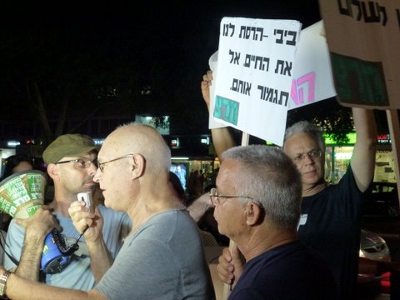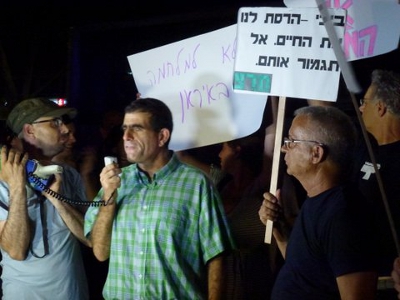Two weeks ago a few hundred angry and worried demonstrators gathered outside Defense Minister Ehud Barak’s luxury apartment in a new hi-rise building in the heart of Tel Aviv to protest against the possibility of an Israeli-initiated war with Iran. “No to war with Iran!” was one of the main slogans they shouted, while carrying placards such as “Bibi – You ruined our life – Don’t end it!” and “Gog and Magog – No Thank You!”
What is going on here?
In my neighborhood, and as I wander around Tel Aviv, people are anxious about all the war talk, and they really don’t understand what is going on.
The weekend scare headlines declared “Netanyahu and Barak are Determined to Attack Iran in the Fall” (Yediot Aharonot). And yesterday Netanyahu asked for and received more executive powers from his cabinet.
And yet we are told that the entire current senior security echelon – IDF Chief of Staff General Benny Gantz, Air Force Commander Maj.-Gen. Amir Eshel, Mossad Head Tamir Perdo and Military Intelligence Chief Maj. Gen. Aviv Kochavi, are opposed, though they are not allowed to speak about this in public. Recently retired heads of the security establishment, who can speak in public, including former Chief-of-Staff Gabi Ashkenazi, former Mossad Head Meir Dagan and former Shin Bet head Yuval Diskin have all spoken out strongly against the move. And they have been joined by former Prime Minister Ehud Olmert, and head of the opposition Shaul Mofaz, also a former Chief of Staff. Even the majority of the eight members of Netanyahu’s inner cabinet, Deputy Prime Minister and Minister of Strategic Affairs Moshe Ya’alon, another former Chief of Staff, and Deputy Prime Minister and Minister of Intelligence and Atomic Energy Dan Meridor, are opposed. Since then, they have been joined by President Shimon Peres, backed by former President Yitzhak Navon.
Most importantly, President Barack Obama and all of his representatives have repeatedly stated that there is still time for the combination of sanctions and determined diplomacy to work. And the American president was joined by the former Commander of the NATO Forces in Libya, Lt. Gen. Charles Bouchard, who warned against the “illogical and irresponsible step” of an attack on Iran without international support.

“The height of irresponsibility”
On Friday August 10th, dozens of Israel Prize winners and other senior scientists, academics and intellectuals published an ad in Haaretz under the headline “Black Flag”, who issued a warning that “Netanyahu cannot turn hundreds and thousands of Israeli soldiers and civilians into victims – based on the hope that maybe, just maybe, he will succeed with the help of their sacrifice to drag the United States of America into a war. We the undersigned say that a war under such circumstances is the height of irresponsibility. Such an attempt…is liable to endanger the strategic alliance with the United States…”
So what is going on here? Some people think that Netanyahu, labeled “King Bibi” by Time, who has been under tremendous criticism back at home, is trying to divert attention from all of his troubles – the accusations by victims of the Carmel fire, the social protest movement and his lack of initiative to advance Israeli-Palestinian peace, by trying to focus all attention on Iran. Some wags even suggest that he wouldn’t mind “sacrificing Tel Aviv”, the heart of the social protest movement and general opposition to his policies.
Is Barak a successor to Rabin?
As for Barak, he remains an enigma. He claims to be a successor to Prime Minister Yitzhak Rabin. The problem with that analogy is that Rabin believed that it was essential to resolve the Israeli-Palestinian conflict in order to significant reduce the tensions between Israel and the Arab and Moslem world and isolate a hostile Iran, making it easier to confront it. And Rabin considered Israel’s alliance and coordination with the American government to be the foundation of Israel’s security and political interests. Barak has not followed that path.
I think it’s more accurate to consider Moshe Dayan as his forerunner. Dayan always believed in leaving two if not three doors open to every situation, and was a master of double-speak.
It’s therefore not coincidental that the organizers of last night’s demonstration decided to focus on Barak, and not on Netanyahu. It’s still not clear what the defense minister wants. And for good measure, one of the young demonstrators took the megaphone and reminded the defense minister that he is living temporarily in an apartment which costs 30,000 shekels a month, and one of the main planks of the social protest movement is the need for affordable housing for young people.
While military strategists talking about “rolling operations”, the organizers of last nights protest are determined to maintain a “rolling protest”, a nightly demonstration/vigil next to Barak’s home, until he gets the message.
Clearly, it would be extremely dangerous if Iran were to obtain a nuclear weapons option, even if their declared aim is only defensive. If the Iranians obtain nuclear weapons it would set in motion a chain reaction of nuclear proliferation in the region, probably including Saudi Arabia, Egypt and Turkey, creating an extremely unstable and dangerous situation.
But there is a consensus among the local and international commentators that Israel cannot prevent Iran from gaining nuclear weapons on its own.
The combination of sanctions and determined diplomacy must be given a chance to work.

Helsinki Conference for a Nuclear and WMD Free Zone in the Middle East
Surprisingly, one element which is not a part of the public discourse in Israel is the fact that a conference is scheduled to take place in Helsinki, at the end of 2012, to discuss the dynamics of the creation of a Nuclear and Mass Destruction Weapons Free Zone in the Middle East, under the auspices of the governments of the U.S., UK, Russia and the UN Secretary General. Both Israel and Iran are invited to participate in that conference, together with all of the other countries in the region. While no one expects the conference to produce an agreement, it is an opportunity to set in motion a diplomatic process that can both diffuse the current crisis and outline a road map towards a new regime of peace and security in the region.
The Price of Paralysis
On the evening of August 28th, the One Voice movement held a marathon protest on Rothschild Blvd. in Tel Aviv, where the mass social protest movement burst forth in the summer of 2011. The title of the protest was “The Price of the Paralysis”, featuring a marathon of short presentations by many public figures, including current and former members of Knesset, social protest and peace activists, former security officials and many others, each of whom spoke for 5 minutes on the connection between the continuation of the occupation, the rising settlement and security costs and the cost in lost social and educational services to the general Israeli public.
One of the speakers was writer Sefi Rachlevsky who initiated the Black Flag petition warning against a unilateral Israeli attack on Iran. Rachlevsky began his words by saying ominously that “many of the people standing here may no longer be alive soon, if Netanyahu carries out his threats…”
Meanwhile, young people in Tel Aviv are finding that the best antidote to fear and anxiety is action. Ehud Barak and his neighbors have been experiencing the results of these protest actions every evening for the past two weeks.
An earlier version of this piece was published in The Times of Israel under the title No to War with Iran! | Hillel Schenker | Ops & Blogs | The Times
